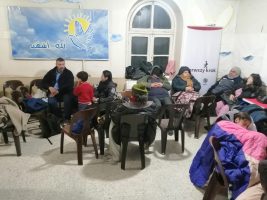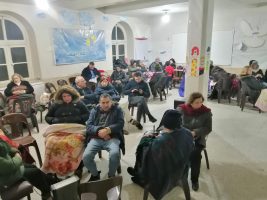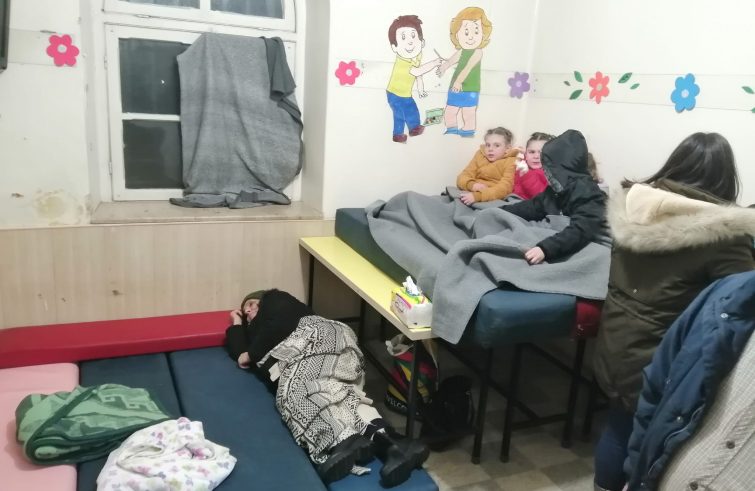
The death toll from yesterday morning’s 7.9 magnitude earthquake that shook Turkey and north central Syria at 4.17am has reached 4,365. Turkey’s national authorities updated the death toll to 2,921, Syria reports 1441 confirmed victims. Sadly, the toll is only provisional. Rescuers are still digging to pull people out from under the rubble, but it is a race against time. The cold weather and heavy rainfall are slowing down operations and the earth has not stopped shaking either: two tremors were recorded at 3.47 and 3.53 a.m. last night.
Rough sleeping and open churches. Speaking to SIR, Filippo Agostino, AVSI Foundation representative in Syria, describes Aleppo as a “ghostly, deserted city. All that can be heard are the sounds of rescue operations. All shops and cafes are closed. Most people have slept in their cars or outdoors, in parks, under tarpaulins adjusted as tents, warming themselves with makeshift campfires. Only a few people have returned to their homes, due to extreme fear and the high risk of building collapse. Relief and rescue operations started immediately. Excavators, bulldozers, cranes, are working incessantly, even ambulances are running continuously, saving many lives, but it’s a race against time.”
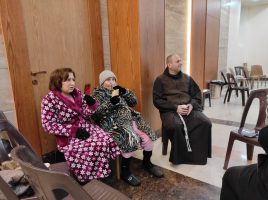 “All the churches have opened their doors to the stranded population,” Father Bahjat Elia Karakach, a friar of the Custody of the Holy Land and Latin parish priest in Aleppo, told SIR. “Many people were sheltered in premises used for pastoral activities. More than 400 people found shelter here in the parish, sleeping on the ground and on chairs. We celebrated Holy Mass and in the early morning hours we gave them breakfast. We supplied 2,000 meals yesterday alone, 500 of which we delivered to the eastern area of Aleppo, the most heavily damaged part of the city, having been bombed during the siege. Many residents are buried under the rubble. We are providing food for everyone without distinction and we have opened our doors to anyone in need. Now we will start to assess the damage to private homes, many were severely damaged and are unsafe. It’s important that people return to their homes if possible and in safe conditions.” Meanwhile, relief operations continue non-stop. “ Several truckloads of relief supplies, including food and clothing, departed last night for Latakia and Aleppo, the hardest hit areas. However, these supplies are enough for short-term needs” Agostino pointed out. Syria’s earthquake-stricken population will be in need of much more humanitarian aid in the medium and long term. What will happen when they run out of supplies? International aid is needed to support the population. After 12 years of war, extreme poverty, the COVID epidemic and now the earthquake, Syria cannot cope alone.”
“All the churches have opened their doors to the stranded population,” Father Bahjat Elia Karakach, a friar of the Custody of the Holy Land and Latin parish priest in Aleppo, told SIR. “Many people were sheltered in premises used for pastoral activities. More than 400 people found shelter here in the parish, sleeping on the ground and on chairs. We celebrated Holy Mass and in the early morning hours we gave them breakfast. We supplied 2,000 meals yesterday alone, 500 of which we delivered to the eastern area of Aleppo, the most heavily damaged part of the city, having been bombed during the siege. Many residents are buried under the rubble. We are providing food for everyone without distinction and we have opened our doors to anyone in need. Now we will start to assess the damage to private homes, many were severely damaged and are unsafe. It’s important that people return to their homes if possible and in safe conditions.” Meanwhile, relief operations continue non-stop. “ Several truckloads of relief supplies, including food and clothing, departed last night for Latakia and Aleppo, the hardest hit areas. However, these supplies are enough for short-term needs” Agostino pointed out. Syria’s earthquake-stricken population will be in need of much more humanitarian aid in the medium and long term. What will happen when they run out of supplies? International aid is needed to support the population. After 12 years of war, extreme poverty, the COVID epidemic and now the earthquake, Syria cannot cope alone.”
- (Foto Parrocchia latina Aleppo)
- (Foto Parrocchia latina Aleppo)
- (Foto Parrocchia latina Aleppo)
- (Foto Parrocchia latina Aleppo)
Mounting risk of cholera epidemic. There is another serious threat: the possible recrudescence of the cholera epidemic. “We are extremely worried,” said the AVSI representative, “There was a cholera outbreak at the end of August last year. It began in the rural surroundings of Aleppo, spread to the city, and reached the north-west and north-east of the country, with more than 1,000 confirmed cases of acute diarrhoea. It caused over 60 deaths. These figures make this epidemic one of the biggest, if not the biggest cholera epidemic in the world today. Not even Haiti or Somalia reported so many cases.” The epidemic is caused, inter alia, by the lack of maintenance of water systems, limited humanitarian and public aid for political reasons, which prevented major infrastructure improvements, coupled by the heavy drought of the past few months. Cholera is symbolic of Syria’s socio-economic deterioration caused by war, poverty, and sanctions that weigh heavily on the population”, said Agostino. “We had successfully attempted to stem the spread of the disease in cooperation with the United Nations, but now, with the earthquake, there could be a new outbreak. That is why the corpses lying under the rubble must be recovered as soon as possible.” “As AVSI we had planned to depart with mobile clinics from St. Louis Hospital in Aleppo to bring medical care to the most remote rural areas. But after the earthquake priorities have changed, not only cholera but also people’s psychological and physical recovery. “The last two years were marked by war, COVID and the spread of cholera, now the earthquake. As a result, the population is disoriented and unable to cope with these tragedies. There were still hopes for a better future, somehow cherished during the war, but that hope no longer exists today. It will be important to support them in every possible way. It’s nice to see so much solidarity, but we need an easing of sanctions on Syria: it would be extremely useful in terms of humanitarian relief.”
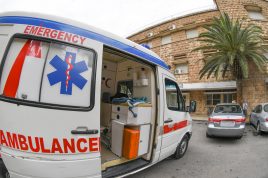 Cardinal Zenari will arrive today. The Apostolic Nuncio to Syria, Card. Mario Zenari, is expected to arrive in Aleppo today. This meaningful presence testifies to Pope Francis’ closeness to the “beloved Syria.” The cardinal is the inspirer of the ‘Open Hospitals’ project – operated on the ground by AVSI – involving three Catholic hospitals, two in Damascus and one in Aleppo, the St. Louis Hospital, providing free medical care to the poorest and most vulnerable Syrians. “Together with the nuncio, we will try to identify the most critical emergency situations – says Agostino – and we will visit the St. Louis Catholic Hospital, which stopped providing ordinary healthcare services after the earthquake in order to focus on treating the victims of the earthquake. Ten were hospitalised and over 80 were examined. We are planning to visit all 17 reception centres set up by the Syrian authorities with our local staff and with the staff of other international organisations here in Aleppo, to determine the needs of displaced residents. There is a shortage of blankets, which we ordered yesterday. We plan to organise leisure activities for the children and counselling sessions for their mothers with a view to identifying specific actions to alleviate this umpteenth trauma. In this effort”, concludes the AVSI representative, “we are supported by the Italian Foreign Ministry, which expressed its full support for all forms of assistance.”
Cardinal Zenari will arrive today. The Apostolic Nuncio to Syria, Card. Mario Zenari, is expected to arrive in Aleppo today. This meaningful presence testifies to Pope Francis’ closeness to the “beloved Syria.” The cardinal is the inspirer of the ‘Open Hospitals’ project – operated on the ground by AVSI – involving three Catholic hospitals, two in Damascus and one in Aleppo, the St. Louis Hospital, providing free medical care to the poorest and most vulnerable Syrians. “Together with the nuncio, we will try to identify the most critical emergency situations – says Agostino – and we will visit the St. Louis Catholic Hospital, which stopped providing ordinary healthcare services after the earthquake in order to focus on treating the victims of the earthquake. Ten were hospitalised and over 80 were examined. We are planning to visit all 17 reception centres set up by the Syrian authorities with our local staff and with the staff of other international organisations here in Aleppo, to determine the needs of displaced residents. There is a shortage of blankets, which we ordered yesterday. We plan to organise leisure activities for the children and counselling sessions for their mothers with a view to identifying specific actions to alleviate this umpteenth trauma. In this effort”, concludes the AVSI representative, “we are supported by the Italian Foreign Ministry, which expressed its full support for all forms of assistance.”


